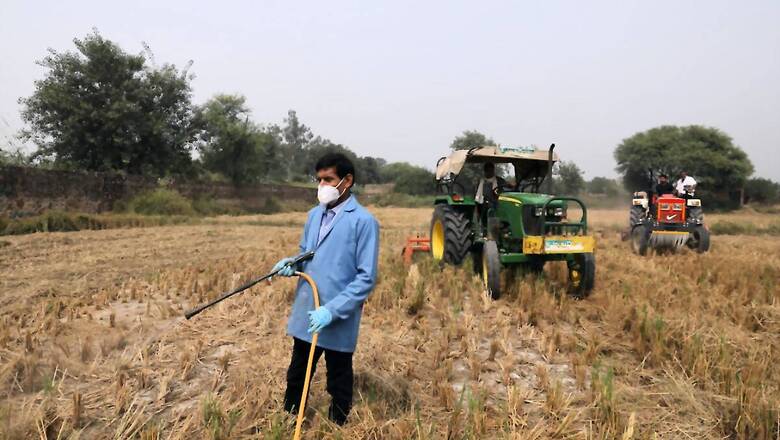
views
On October 6, in Kharkhari village of Najafgarh, agricultural extension officers of Delhi government under the supervision of Indian Agricultural Research Institute (IARI) scientists kickstarted the process of making a special solution using the Pusa bio-decomposer for large-scale use across 700 -800 hectares of land in Delhi where non-basmati rice is being grown. With commonly used ingredients like jaggery, besan in water, capsules of the Pusa bio-decomposer are added and allowed to ferment for seven days.
On October 13, large-scale field trials began in Hiranki village, Narela, with Delhi chief minister Arvind Kejriwal inaugurating the exercise while teams of IARI scientists were busy keeping an eye on the process and collecting samples before and after the spraying was done. Exactly fifteen days later, the result has been promising with the stubble in a higher state of decomposition compared to the stubble in neighbouring fields where the bio-decomposer was not used.
Dr Roaf Ahmad Parray, scientist with the division of agricultural engineering, ICAR-IARI, who had said that the trials are still at an experimental stage, is enthused with the result, calling it “successful” and a “scientific solution”. “Yesterday, our team visited the site and found that 90% of the paddy residue has almost degraded. There is no visible paddy straw in the field. In fact, farmers can use the fields for sowing operations,” he said.
The technology behind the Pusa bio-decomposer is simple, as explained by Dr Livleen Shukla. “This technology basically deals with the microbial consortium which are lignocellulolytic in nature and this when applied in the field will be converted into compost in the field itself.”
Farmers in Hiranki village will go for sowing operations from November 10 since the fields still have water in them. The most critical criteria of decomposing the paddy residue in a short duration had been achieved here.
Dr Parray said that while earlier trails were in lab conditions and field trials had happened in Punjab and Haryana, for the first time large-scale field demonstration has happened and it has been “100% successful”.
Teams of two from the IARI, comprising a scientist and a researcher, would visit the sites where such trials have happened and collect soil samples to detect any change in organic matter.
The Delhi government has taken the Pusa bio-decomposer innovation to the fields at a cost of twenty lakh rupees. The aim of the government is also to showcase this as a solution to stubble burning in Punjab, Haryana, parts of Uttar Pradesh and Rajasthan. The fact that it is cheap makes it additionally attractive.
Read all the Latest News and Breaking News here















Comments
0 comment